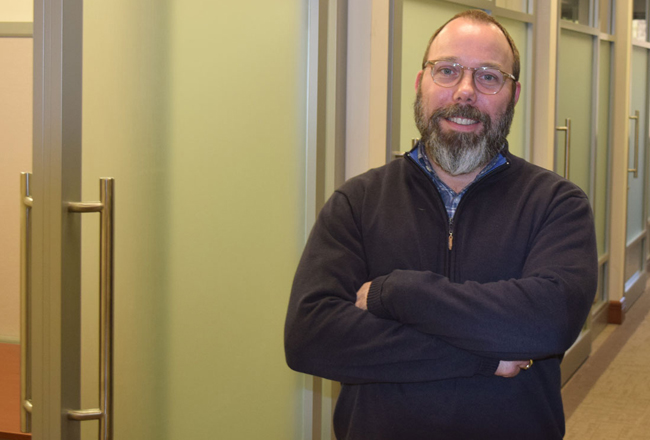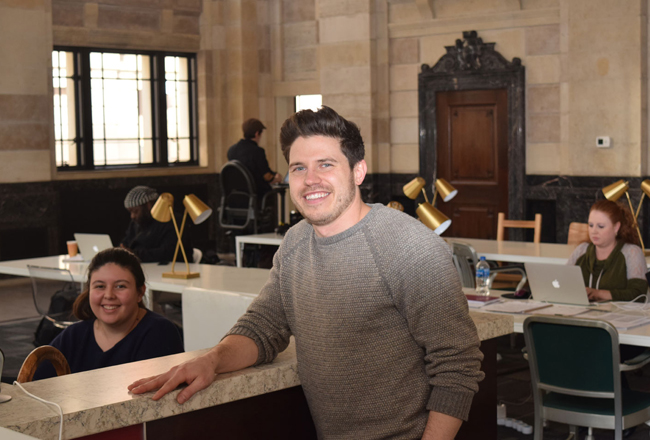
Charlie Shipman decided to leave his job at Merrill Lynch Wealth Management in lower Manhattan and create Blue Keel Financial Planning in 2014 from his Weston home when he realized that he was spending more time during the weekdays with the Metro-North conductors than with his family.
“The commute was killing me,” he recalled. “It was two hours and 20 minutes, door to desk, each way. And I had to be on the 5:59 a.m. train to get to work.”
In this edition of Suite Talk, Business Journal reporter Phil Hall speaks with Shipman about his company and the concerns that his clients are expressing about the state of the economy.
Who are your clients and what are your services?
“I target small-business owners. I have clients in Connecticut, as well as in Georgia, California, North Carolina, Florida and New Jersey.
“I offer three different services: comprehensive and holistic financial planning; portfolio management; and college planning and funding. The college focus has become a bigger thing recently, and it is a little different than what most advisers do. Instead of just setting up a 529 savings account for a child or children and figuring out how much you can save on a monthly or annual basis, what I offer is sitting down with a list of schools and studying the personal data about the client. From there, I can tell them what it is going to cost to send their kids to school for four years, down to the penny. That factors in the probable or likely aid they will get, whether it is merit- or need-based, and the idea is to minimize the amount of student loan debt that the kids or the parents have to take on.”
Just how bad is the student debt situation?
“College is ridiculously expensive now and it”™s only going to get worse. The student loan debt is over a trillion dollars. There are a lot of people out there saying that is going to be the next financial crisis. Especially in Fairfield County, you have a lot of people whose kids are very bright and they want to go to top schools.
And top schools aren”™t cheap anymore ”” I don”™t know if top schools were ever cheap. Even public schools out in California in the UC system, you”™re looking at close to $70,000 a year.”
Do you believe that today”™s small-business owners are able to see the bigger picture in terms of their future financial needs?
“As a blanket statement, no. Everyone is unique and the business owners I run into know a little bit and are somewhat aware. Typically, it is more about when things are not going well ”” that is when they”™re aware of that. Most of my clients are really good at what they do, but the financial side is where they can use help and organization.”
Are you hearing increased complaints from your Connecticut clients about the costs of doing business in the state?
“I am not hearing anything different. Rents are high, but the typical business owner I”™m working with is small enough that they are not impacted by things at more of a corporate level ”” they are LLCs, not C corporations, and it is the C corporations that are leaving. But for my clients, their businesses are good. Whether it is a salon owner or a counseling therapist or restaurant owner, they are all doing well. They haven”™t had any issues on that.”
How do you determine what is the best investment vehicle for a business owner to consider?
“It”™s about sitting down and talking to them about their goals and objectives, which enables me to identify a risk profile for them and to determine what their time frame is. In terms of short-term or midterm range, we have to do a little bit more work from where they are to where they want to be, whether it is five years from now versus 20 or 25 years from now.”
Are your clients optimistic about the economy”™s future?
“No, they”™re not. And it is a combination of things. For clients in Connecticut, there is obviously a bit of a fiscal crisis in our own state, especially with pension funding problems at the state level. At the federal level, politics is so crazy nowadays. It”™s like reality television and I don”™t know why it”™s become like that ”” and it”™s not just from the executive branch, but also from Congress. And it translates over to the economic side of things.
“There is such short-term volatility. Look at the China trade deals. Things go well one day and the stock market goes up. The next day, things aren”™t so great and the president tweets out something and the stock market goes down 1 percent. There is too much of that going on.
“Also, the stock market doesn”™t work the way it used to. Now, it”™s market psychology and what the robots and the trading algorithms are going to do. It”™s not flash-crash like 2008. But if General Electric goes down 1 percent, all of these trading algorithms are going to kick in and it”™s going to self-correct in a very short period of time.
“I try to steer my clients away from thinking about those short-term movements. It is typically a multiyear strategy that we are looking at. It”™s not next week or next month, but five years down the road.”
Would it be fair to say that it has also been a learning curve for you, considering how the market has changed over the past several years?
“Yes, but I will say it is not to the same degree as a hedge fund manager. I”™m not looking to do active-active management. It”™s active-passive management, if that makes sense. A lot of the portfolios I put together are ETFs or mutual funds and it”™s looking for the right allocation based on those goals, time horizon and risk profile, and try to create a diversified portfolio that can weather all of those things.
“We are not investing in bitcoin, 3-D printing, AI and the fringe social media stuff. It is more about getting a good cross-section of all industries, all sectors and all regions and try to get some of that level growth.”
I was just going to ask about bitcoin ”” so, I take it that you feel cryptocurrency is just too risky?
“Yes, without a doubt. The watershed moment for me was when somebody in their 80s started to ask me about investing in bitcoin. I tried to get them to explain to me, in their words, what bitcoin was and they had no idea. They just knew people were making money and experiencing a lot of growth.
“The same thing happened last year with the pot stocks ”” suddenly, people I knew who never previously mentioned marijuana wanted to become marijuana investors. And I was like, ”˜No because (a) it is extremely volatile right now and (b) it”™s illegal at a federal level.”™
“My clients are not going to be investing in that in any account I am managing. If they do it on their own, that”™s another thing.”
And where do you get your clients?
“Referrals, either from other clients or personal connections. I do a little bit of social media marketing. I”™ve spent money on SEO marketing with the website and I”™ve gotten around in different networking groups. And getting out and meeting people.
I spent a lot of time and money trying to do digital marketing and I found that I wasn”™t seeing much turnaround there. So, I went back to old-school analog marketing ”” basically, getting to know people. If you get to know enough people, they will bring people your way.”






















